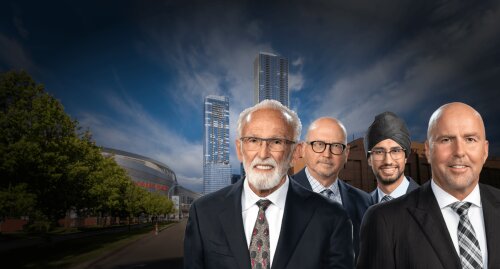Best Truck Accident Lawyers in Edmonton
Share your needs with us, get contacted by law firms.
Free. Takes 2 min.
List of the best lawyers in Edmonton, Canada
About Truck Accident Law in Edmonton, Canada
In Edmonton, Canada, the law governing truck accidents is similar to that of other motor vehicle accidents. The law primarily stresses liability, insurance claims, and individuals' rights to compensation after an accident. As per law, the truck drivers and companies need to adhere strictly to safety regulations. If a truck driver or company is found to be negligent, they can be held legally responsible for the accidents and any subsequent damages or injuries.
Why you may need a Lawyer
If you are involved in a truck accident, seeking legal advice can be highly beneficial. There are various reasons why you might need a lawyer in such scenarios. If you are injured in the accident and want to file a personal injury claim, a lawyer can build and present a viable case for you. If you are found at fault even partially, you will need legal guidance to navigate the intricate legal procedures and defend yourself. Similarly, if your insurance claim is denied or you are claiming compensation from a trucking company, professional legal help can provide much-needed support.
Local Laws Overview
In Edmonton, it is mandatory for all drivers, including truck drivers, to have insurance that covers physical injury and property damage. Any victim of a truck accident can claim compensation from the responsible party's insurance provider. Furthermore, the Alberta Traffic Safety Act can deem a company liable if their violation of safety regulations led to the accident. The law puts a cap on pain and suffering damages to $4,000. There is, however, no cap on loss of income or medical expenses that result from a truck accident.
Frequently Asked Questions
1. How much time do I have to file a lawsuit for a truck accident?
In Alberta, the limitation period is typically two years from the date of your accident. However, this time limit may vary depending on specific circumstances related to the accident.
2. What if I was partly at fault in the accident?
In Edmonton, if more than one driver was at fault in an accident, the liability is determined proportionally. Even if you are found to share part of the blame, you can still pursue compensation from the other party.
3. Can I get compensation if I did not have any physical injuries?
Yes, you can seek compensation for emotional or physical trauma even without visible physical injuries. It includes trauma, psychological distress, or lifestyle changes.
4. How much compensation can I expect from a truck accident?
The compensation amount differs based on several factors, such as medical costs, loss of income, the severity of injury, and more. Seek a professional legal expert's advice for a more accurate assessment.
5. Can I file a claim against the trucking company?
Yes, if a trucking company's negligence contributed to the accident, you could file a claim against the company.
Additional Resources
The Alberta Motor Association (AMA) and the Alberta Ministry of Transportation are excellent resources for understanding the boundaries of traffic safety laws. They can provide valuable guidance for your truck accident case. The Alberta Insurance Commission can also be beneficial if you have any issues related to your insurance claim.
Next Steps
If you need legal assistance in a truck accident situation, consider contacting a reputable law firm specializing in motor vehicle accidents. Prepare all relevant documents like medical records, police reports, and insurance policy details. Keep a record of all accident-related expenses. These preparations go a long way in establishing a strong case in your favor.
Lawzana helps you find the best lawyers and law firms in Edmonton through a curated and pre-screened list of qualified legal professionals. Our platform offers rankings and detailed profiles of attorneys and law firms, allowing you to compare based on practice areas, including Truck Accident, experience, and client feedback.
Each profile includes a description of the firm's areas of practice, client reviews, team members and partners, year of establishment, spoken languages, office locations, contact information, social media presence, and any published articles or resources. Most firms on our platform speak English and are experienced in both local and international legal matters.
Get a quote from top-rated law firms in Edmonton, Canada — quickly, securely, and without unnecessary hassle.
Disclaimer:
The information provided on this page is for general informational purposes only and does not constitute legal advice. While we strive to ensure the accuracy and relevance of the content, legal information may change over time, and interpretations of the law can vary. You should always consult with a qualified legal professional for advice specific to your situation.
We disclaim all liability for actions taken or not taken based on the content of this page. If you believe any information is incorrect or outdated, please contact us, and we will review and update it where appropriate.








